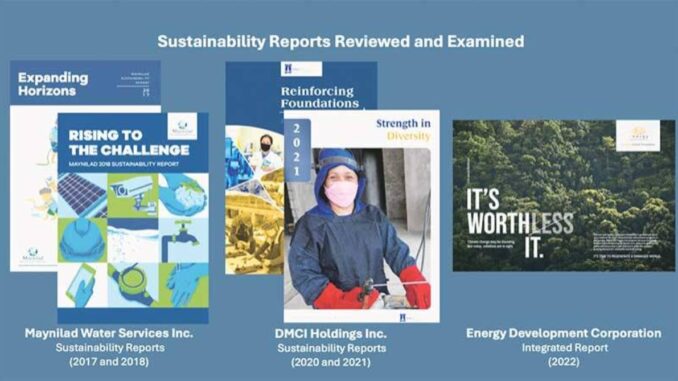
This is the abridged version of my keynote address during the Online ESG Conference organized by the World Environment Council.
ENVIRONMENTAL, Social and Governance (ESG), a term first coined in 2004 in a report by the United Nations titled “Who Cares Wins,” has become increasingly important in shaping the way businesses and investors approach sustainability and ethical considerations in decision-making. ESG encompasses a broad array of issues, including environmental practices, social responsibility and corporate governance. The current significance of ESG and its future direction provide a paradigm shift in corporate responsibility and investment strategies.
ESG factors cover a wide spectrum of issues that traditionally are not part of financial analysis yet may have financial relevance. This may include how corporations respond to climate change, how good they are with water management, how effective their health and safety policies are in protecting against accidents, how they manage their supply chains, how they treat their workers and whether they have a corporate culture that builds trust and fosters innovation.
List of Sustainability Reports reviewed and examined by the author from 2018 to 2023. CONTRIBUTED IMAGE
As a sustainability professional, I have thoroughly analyzed and assessed the sustainability reports of Maynilad Water Services, DMCI Holdings and Energy Development Corp. from 2018 to 2023. Companies have recognized the significance of ESG factors in determining their long-term viability and risk management. Nowadays, many companies strive to enhance transparency by publishing detailed sustainability reports that encompass their ESG performance, commitments and strategies. In the Philippines, publicly listed companies are obliged to comply with the Securities and Exchange Commission’s Memorandum Circular 4, which mandates the submission of sustainability reports.
Despite the advancements made, challenges persist in the realm of ESG metrics, greenwashing and the lack of standardization in reporting frameworks. According to PwC’s Global Investor Survey 2023, a staggering 94 percent of global investors are skeptical of the claims made in corporate sustainability reports, believing them to be unsupported to some extent.
The future of ESG is poised for significant transformation as it continues to evolve in response to societal expectations, regulatory landscapes and technological changes. Several trends are anticipated.
One key trend is the development of a standardized framework for measuring and reporting ESG performance. This is critical for enhancing transparency and comparability. Initiatives such as the International Financial Reporting Standards Foundation’s creation of the International Sustainability Standards Board aim to unify global ESG standards.
Another trend in business strategies is the growing integration of ESG factors. A study titled “An empirical analysis of the impact of ESG on financial performance: the moderating role of digital transformation,” published in August 2023 in the journal Frontiers, has found a positive correlation between strong ESG practices and financial performance. As a result, companies will prioritize incorporating ESG considerations into their strategies. Investors will actively include these considerations in financial assessments.
Different sectors face unique ESG challenges, so sector-specific standards are expected to emerge. These standards will address risks and opportunities specific to each sector and help companies manage their ESG impacts more effectively.
Stakeholders’ role
Climate change is a pressing issue, and companies and governments will need to shift their focus from simply measuring emissions to developing comprehensive strategies for climate resilience and adaptation. This may involve investing in green technologies, sustainable infrastructure and collaborative efforts to achieve climate goals.
The stakeholders’ role in shaping corporate ESG policies will grow. Companies will increasingly engage with them to identify material ESG issues and incorporate diverse perspectives into decision-making processes.
Technological advancements, such as artificial intelligence and machine learning, will improve the quality of ESG data analysis, enhance the ability to identify trends, assess risks and provide predictive insights for ESG-related decision-making.
The understanding of what constitutes ESG issues may continue to expand. Issues such as diversity, equity and inclusion; labor rights; and supply chain sustainability will gain prominence, reflecting increasing societal demands for accountability.
Impact investing, which involves investing to generate social or environmental impact alongside financial returns, will expand. More funds will be directed toward addressing pressing global challenges, such as poverty alleviation, health care accessibility and education.
ESG’s evolution from its origins in socially responsible investing to its current status as a mainstream integrated approach to business and finance illustrates a profound shift in corporate behavior and investment strategies. As the world faces unprecedented challenges such as climate change, social inequalities and governance failures, ESG principles will continue to play a critical role in shaping a more sustainable and equitable future.
The journey ahead will involve collaboration among governments, businesses, investors and civil society. As we move into the future, fostering an environment where ESG principles are embedded into the very fabric of business and investment practices will be paramount for achieving long-term sustainability and creating value for all stakeholders. The convergence of ethics and economics will define ESG’s next chapter, highlighting its significance not just as a trend but as an essential component of a responsible and resilient global economy.
The author is the founder and chief strategic advisor of the Young Environmental Forum and a director of Climate Tracker Asia Inc. He completed a climate change and development course at the University of East Anglia (United Kingdom) and an executive program on sustainability leadership at Yale University (USA). You can email at


Be the first to comment